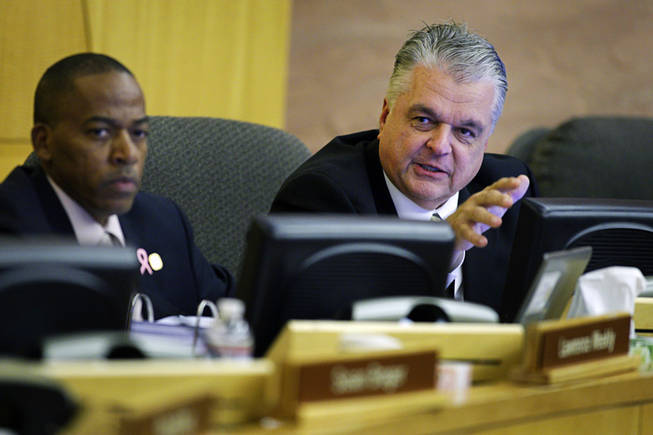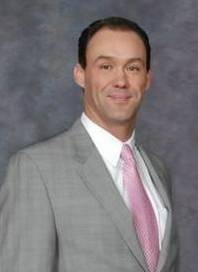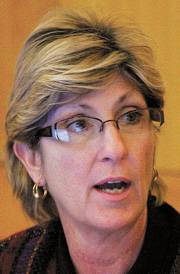
Clark County Commissioner Steve Sisolak, shown in this file photo from last year, is calling for an investigation into firefighter sick leave.
Tuesday, Feb. 1, 2011 | 7:36 p.m.
Sick leave abuse
KSNV coverage of county reports of widespread abuse of sick leave within fire department, Feb. 1, 2011.

Edward Finger

Chris Giunchigliani
Sun archives
- Sisolak calls for investigation of firefighter sick leave (1-21-2011)
- Sisolak calls for local, state, federal probes of fire union after arbitrator’s decision (1-20-2011)
- Arbitrator: Fire union offer had problems; county needs to curb sick leave abuse by firefighters (1-20-2011)
- Arbitrator backs county over firefighters’ union in contract negotiations (1-19-2011)
- County firefighters union preaches frugality, to others (11-2-2010)
- Sisolak offers proof of firefighters ‘gaming’ sick leave system (9-11-2010)
- County, firefighters’ union spar over contract negotiations (8-3-2010)
- Is a wave of county firefighter retirements on the horizon? (6-25-2010)
- Rory Reid says firefighters union resorting to ‘scare tactic’ with ad (6-15-2010)
- County considers plan to privatize airport firefighting force (6-11-2010)
- New plan to curtail Clark County firefighter overtime (6-5-2010)
- Staffing shuffle would cut county Fire Department overtime (5-20-2010)
- Las Vegas, Clark County collaborate to limit firefighter overtime (4-27-2010)
- Fire union resists move to increase its ranks, reduce overtime costs (4-16-2010)
- Has fire union support become a campaign curse? (4-15-2010)
Abuse of sick leave by Clark County firefighters was more widespread than union officials acknowledged, county officials reported Tuesday.
More than a third of firefighters used more than month’s worth of sick pay last year, officials said. While some firefighters had legitimate reasons to use sick leave, evidence shows some did not and gamed the system to make extra money and take longer vacations, officials said.
Assistant County Manager Ed Finger presented county commissioners an abbreviated version of his testimony to an arbitrator who recently sided with the county in contract negotiations with the firefighters union.
The report details how firefighters were able to use massive amounts of sick leave and vacation time to take extended periods off work, even while working overtime and avoiding having to provide proof of illness.
Commissioner Steve Sisolak said the firefighter’s actions are criminal and he has asked the district attorney, the sheriff and the FBI to investigate.
Firefighters, who work 24-hour shifts, filled 7.8 percent of their work year in 2009 with sick leave, Finger said.
Battalion chiefs used sick leave to cover 5.6 percent of their shifts and 8- and 10-hour fire department employees used 3.4 percent.
County employees who are members of SEIU used sick leave to cover 4 percent of their scheduled, while Park Police officers and deputy sheriffs used it to cover 3 percent, and county management employees used sick leave for just 1.6 percent of their schedules, Finger said.
Analysis of sick leave usage showed firefighters with between 25 and 30 years of experience used the most sick leave, taking off about one in every six shifts, Finger said.
While older firefighters might be expected to have more injuries and take more sick leave, Finger said, the same group also worked the most overtime and call back time.
Union officials have previously said that only a small group of firefighters were abusing sick leave and that firefighters’ high pay was largely the result of overtime they were forced to work because of short staffing.
“There are lots of employees who don’t abuse sick leave, but it’s more than a few” who do, Finger said. A total of 98 percent of overtime and call back was worked voluntarily, he said.
Union officials also claim the abuse of sick lave was the result of a lack of oversight by fire department administrators and that if chiefs wanted to crack down on it, they could have.
But Finger told county commissioners that the union’s contract prevented officials from requesting a doctor’s note unless the firefighter took four days of sick leave in a row. And even if there was obvious abuse, the union contract offered no punishments, Finger said.
To keep from being caught, firefighters would alternate sick days with vacation days. One firefighter even had a scheduled vacation day, canceled it, then called in sick and took the day off anyway, Finger said.
Finger presented charts showing actual firefighters’ schedules. One firefighter used a combination of regular time off, vacation and sick time to have 23 days in a row off work, but never had four days of consecutive sick leave.
Another firefighter took four and half months worth of sick leave last year but never four shifts in a row, so officials could not investigate it. The same employee worked more than 2,200 hours of overtime and made more than $200,000 last year, Finger said.
The county first approached the firefighters union in March and said the sick leave abuse needed to be addressed in contract negotiations, Finger said. The county asked that the new contract allow officials to request a certificate of illness from a doctor whenever they suspect abuse.
But union negotiators said they would only allow the medical proof if there were more than 12 sick days used in a year.
As the county prepared for arbitration last summer, sick leave abuse was a major consideration for the county, Finger said. So county officials searched firefighters’ e-mail records to find evidence of abuse. Officials found firefighters coordinated their sick leave with other firefighters and with their supervisors.
One firefighter e-mailed a request for time off, saying he would be in Alaska and asking his supervisor to use vacation time and sick leave to take the time off, Finger said.
During negotiations with the arbitrator, the county eventually scaled back the sick leave provisions, with the final contract saying officials can request proof of illness when there are more than five sick leave days used in a year, but the contract still offers no punishments for abuse.
Commissioners said they were appalled by the abuse and said it will continue to be an issue as the county and union prepare for negotiations for the next labor contract, which is due in July.
Commissioner Chris Giunchigliani said she was disappointed in how widespread the problem was.
“Many of us were under the illusion it was just a handful, and if you look at this document, you see that it’s not,” she said, referencing a report from the arbitrator.
Ryan Beaman, president of International Association of Fire Fighters 1908, said he was willing to work with county officials to eliminate the abuse, but said it was the management that needed to institute the change.
“The fire chief can’t turn a blind eye to these issues,” Beaman said. He said he thinks change will come through new chief Bertral Washington, who was appointed in November.
Commissioners pushed back, saying it was the responsibility of everyone in the department to be part of the change.
Commissioner Larry Brown said it was up to each firefighter individually to work with the union and management to bring improvements to the department.
Sisolak said he thinks firefighters should be responsible for their colleagues, just as college students can be punished if they know their peers are cheating and don’t report it.

Join the Discussion:
Check this out for a full explanation of our conversion to the LiveFyre commenting system and instructions on how to sign up for an account.
Full comments policy